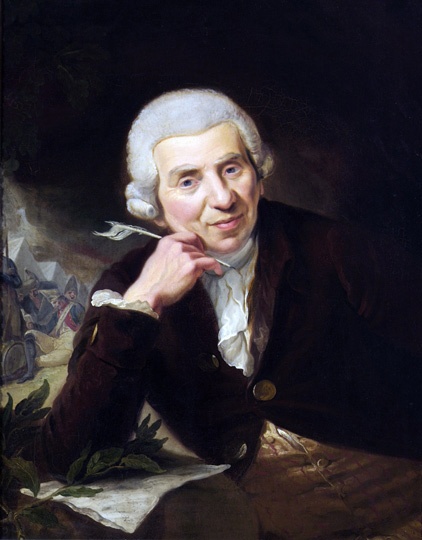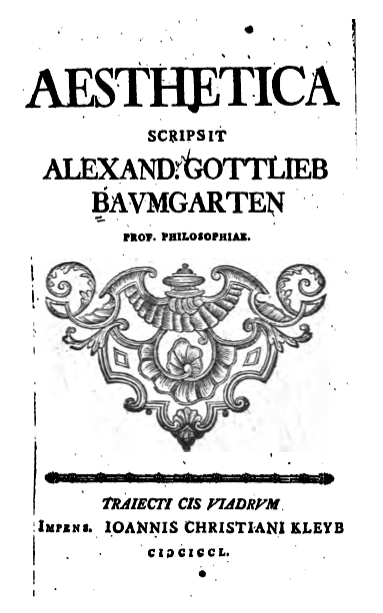|
Johann Wilhelm Ludwig Gleim
Johann Wilhelm Ludwig Gleim (2 April 1719 – 18 February 1803) was a German poet, commonly associated with the Enlightenment movement. Life Gleim was born at the small town of Ermsleben in the Principality of Halberstadt, then part of Prussia. His father, a tax collector, and his mother died early. He attended school in Wernigerode and from 1738 onwards studied law at the University of Halle, where he established a circle of young poets together with his friends Johann Uz and Johann Nikolaus Götz. Having obtained his final degree, he worked as a tutor in Berlin, where in 1743–44 he became secretary to the Hohenzollern prince Frederick William of Brandenburg-Schwedt. Gleim accompanied his employer in the Second Silesian War and made the acquaintance of Ewald Christian von Kleist, whose devoted friend he became. When the prince was killed during the Prussian siege of Prague, Gleim became secretary to Prince Leopold of Anhalt-Dessau; but he soon gave up his position, not b ... [...More Info...] [...Related Items...] OR: [Wikipedia] [Google] [Baidu] |
Halberstadt Cathedral
The Halberstadt Cathedral or Church of St Stephen and St Sixtus (german: Dom zu Halberstadt) is a Gothic church in Halberstadt in Saxony-Anhalt, Germany. It was the episcopal see of the Bishopric of Halberstadt, established by Emperor Charlemagne in 804. The present-day church, which replaced an older Romanesque church,Stiftung Dome und Schlösser in Sachsen-Anhalt , Dom St. Stephanus und St. Sixtus zu Halberstadt was built between 1236 and 1491 in a Gothic style, clearly inspired by the French Gothic cathedrals. In 1591 the Bishop of Halberstadt joined the |
Anacreon
Anacreon (; grc-gre, Ἀνακρέων ὁ Τήϊος; BC) was a Greek lyric poet, notable for his drinking songs and erotic poems. Later Greeks included him in the canonical list of Nine Lyric Poets. Anacreon wrote all of his poetry in the ancient Ionic dialect. Like all early lyric poetry, it was composed to be sung or recited to the accompaniment of music, usually the lyre. Anacreon's poetry touched on universal themes of love, infatuation, disappointment, revelry, parties, festivals and the observations of everyday people and life. Life Anacreon was born around 582 BC at Teos, an Ionian city on the coast of Asia Minor. The name and identity of his father is a matter of dispute, with different authorities naming four possibilities: Scythianus, Eumelus, Parthenius, or Aristocritus. It is likely that Anacreon fled into exile with most of his fellow-townsmen who sailed to Thrace when their homeland was attacked by the Persians. There they founded a colony at Abdera, r ... [...More Info...] [...Related Items...] OR: [Wikipedia] [Google] [Baidu] |
Anacreontics
Anacreontics are verses in a metre used by the Greek poet Anacreon in his poems dealing with love and wine. His later Greek imitators (whose surviving poems are known as the ''Anacreontea'') took up the same themes and used the Anacreontic meter. In modern poetry, Anacreontics are short lyrical pieces that keep the Anacreontic subject matter but not the metre. The Greek meter image:P.Oxy. II 220.jpg, A section from an ancient metrical treatise concerning the ''anacreonteus''. Above the description the lengths of all but the first syllable can be seen marked out; the final syllable is marked as anceps. Near the beginning of the description it is reported that some call the ''anacreonteus'' "Parionic" (παριωνικόν) because of its resemblance to the "class of Ionic meters" (Ἰωνικῶν γένους). ( P.Oxy. II 220 col. vii, 1st or 2nd century CE). The Anacreontic verse or anacreonteus is the eight-syllable line u u – u – u – – (where u = syllable weight, brev ... [...More Info...] [...Related Items...] OR: [Wikipedia] [Google] [Baidu] |
Georg Friedrich Meier
Georg Friedrich Meier (26 March 1718 – 21 June 1777) was a German philosopher and Aesthetics, aesthetician. A follower of Alexander Gottlieb Baumgarten, he reformed the philosophy of Christian Wolff (philosopher), Christian Wolff by introducing elements of John Locke's empiricist theory of knowledge. Career Meier studied philosophy and theology at the University of Halle, where he was a pupil of Baumgarten. Meier succeeded Baumgarten as extraordinary professor, and became a full professor at Halle in 1748. ''Encyclopedia of Philosophy'' online. Animal rights Meier was an early advocate of animal rights. In 1749, Meier authored ''Versuch eines neuen Lehrgebäudes von den Seelen der Thiere'' (Attempt of a new teaching structure from the souls of animals) which ascribed ...[...More Info...] [...Related Items...] OR: [Wikipedia] [Google] [Baidu] |
Alexander Gottlieb Baumgarten
Alexander Gottlieb Baumgarten (; ; 17 July 1714 – 27 MayJan LekschasBaumgarten Family'' 1762) was a German philosopher. He was a brother to theologian Siegmund Jakob Baumgarten (1706–1757). Biography Baumgarten was born in Berlin as the fifth of seven sons of the pietist pastor of the garrison, Jacob Baumgarten, and of his wife Rosina Elisabeth. Both his parents died early, and he was taught by Martin Georg Christgau where he learned Hebrew and became interested in Latin poetry. In 1733, during his formal studies at the University of Halle, he attended lectures on the philosophy of Christian Wolff by at the University of Jena. Philosophical work While the meanings of words often change as a result of cultural developments, Baumgarten's reappraisal of aesthetics is often seen as a key moment in the development of aesthetic philosophy. Previously the word ''aesthetics'' had merely meant "sensibility" or "responsiveness to stimulation of the senses" in its use by ancient ... [...More Info...] [...Related Items...] OR: [Wikipedia] [Google] [Baidu] |
Aesthetics
Aesthetics, or esthetics, is a branch of philosophy that deals with the nature of beauty and taste, as well as the philosophy of art (its own area of philosophy that comes out of aesthetics). It examines aesthetic values, often expressed through judgments of taste. Aesthetics covers both natural and artificial sources of experiences and how we form a judgment about those sources. It considers what happens in our minds when we engage with objects or environments such as viewing visual art, listening to music, reading poetry, experiencing a play, watching a fashion show, movie, sports or even exploring various aspects of nature. The philosophy of art specifically studies how artists imagine, create, and perform works of art, as well as how people use, enjoy, and criticize art. Aesthetics considers why people like some works of art and not others, as well as how art can affect moods or even our beliefs. Both aesthetics and the philosophy of art try to find answers for what exact ... [...More Info...] [...Related Items...] OR: [Wikipedia] [Google] [Baidu] |
Johann Jakob Wilhelm Heinse
(Johann Jakob) Wilhelm Heinse (16 February 1746, Langewiesen, Schwarzburg-Sondershausen – 22 June 1803), German author, was born at Langewiesen in Schwarzburg-Sondershausen (now in Thuringia). After attending grammar school at Schleusingen he studied law at university of Jena, Jena and university of Erfurt, Erfurt. In Erfurt he became acquainted with Christoph Martin Wieland, Wieland and through him with "Father" Gleim who in 1772 procured him the post of tutor in a family at Quedlinburg. In 1774, he went to Düsseldorf, where he assisted the poet Johann Georg Jacobi, JG Jacobi to edit the periodical ''Iris''. Here the famous picture gallery inspired him with a passion for art, to the study of which he devoted himself with so much zeal and insight that Jacobi furnished him with funds for a stay in Italy, where he remained for three years (1780-1783). He returned to Düsseldorf in 1784, and in 1786 was appointed reader to the elector Frederick Charles Joseph, archbishop of Mainz, ... [...More Info...] [...Related Items...] OR: [Wikipedia] [Google] [Baidu] |
Franz Muncker
Franz Muncker (4 December 1855, in Bayreuth – 7 September 1926, in Munich) was a German literary historian. From 1873 he studied Old German and Romance languages and literature under Konrad Hofmann and modern languages and literature with Michael Bernays at the University of Munich, receiving his doctorate in 1878. In 1890 he was appointed successor to Bernays at Munich, where from 1896 to 1926, he served as a full professor of modern German literary history. Published works From 1886 to 1924 he worked on a 23-volume edition of Gotthold Ephraim Lessing's writings and letters; title''Gotthold Ephraim Lessings sämtliche schriften'' His biography of Wagner, ''Richard Wagner : Eine Skizze seines Lebens und Wirkens'' (1891), was translated into English and published a''Richard Wagner; a sketch of his life and works'' Muncker's other principal works are the following: * ''Joufrois : Altfranzösisches rittergedicht'' (with Konrad Hofmann, 1880) – " Joufrois", an old French k ... [...More Info...] [...Related Items...] OR: [Wikipedia] [Google] [Baidu] |
Holtemme
The Holtemme is a long tributary of the river Bode in Saxony-Anhalt, Germany. It rises in the Harz mountains at the eastern foot of the Brocken, descends during its upper course as the Steinerne Renne, a steep stream bed riddled with granite rocks, flows through Hasserode, Wernigerode and past their villages of Minsleben and Silstedt, through Derenburg and Halberstadt and discharges into the Bode. In Wernigerode, not far from the western gate, the Zillierbach The Zillierbach (until 1558 called the Zilgerbach) is a stream in the Harz mountains of central Germany ( Harz district) in the state of Saxony-Anhalt. It is about long. The stream rises on the western side of the ''Hohneklippen'' crags and runs ..., which is also known as the ''Flutrenne'', merges into the Holtemme. Rivers of Saxony-Anhalt Rivers of the Harz Rivers of Germany {{SaxonyAnhalt-river-stub ... [...More Info...] [...Related Items...] OR: [Wikipedia] [Google] [Baidu] |
Halberstadt
Halberstadt ( Eastphalian: ''Halverstidde'') is a town in the German state of Saxony-Anhalt, the capital of Harz district. Located north of the Harz mountain range, it is known for its old town center that was greatly destroyed by Allied bombings in late stages of World War II after local Nazi leaders refused to surrender. The town was rebuilt in the following decades. In World War I, Halberstadt was the site of a German military airbase and aircraft manufacturing facilities. In World War II, Halberstadt was a regional production center for Junkers aircraft, which also housed an SS forced labor camp. Halberstadt now encompasses the area where the Langenstein-Zwieberge concentration camp existed. Geography Halberstadt is situated between the Harz in the south and the Huy hills in the north on the Holtemme and Goldbach rivers, both left tributaries of the Bode. Halberstadt is the base of the Department of Public Management of the Hochschule Harz University of Applied Stud ... [...More Info...] [...Related Items...] OR: [Wikipedia] [Google] [Baidu] |
Johann Wilhelm Ludwig Gleim (Langer)
Johann Wilhelm Ludwig Gleim (2 April 1719 – 18 February 1803) was a German poet, commonly associated with the Enlightenment movement. Life Gleim was born at the small town of Ermsleben in the Principality of Halberstadt, then part of Prussia. His father, a tax collector, and his mother died early. He attended school in Wernigerode and from 1738 onwards studied law at the University of Halle, where he established a circle of young poets together with his friends Johann Uz and Johann Nikolaus Götz. Having obtained his final degree, he worked as a tutor in Berlin, where in 1743–44 he became secretary to the Hohenzollern prince Frederick William of Brandenburg-Schwedt. Gleim accompanied his employer in the Second Silesian War and made the acquaintance of Ewald Christian von Kleist, whose devoted friend he became. When the prince was killed during the Prussian siege of Prague, Gleim became secretary to Prince Leopold of Anhalt-Dessau; but he soon gave up his position, not ... [...More Info...] [...Related Items...] OR: [Wikipedia] [Google] [Baidu] |




.jpg)